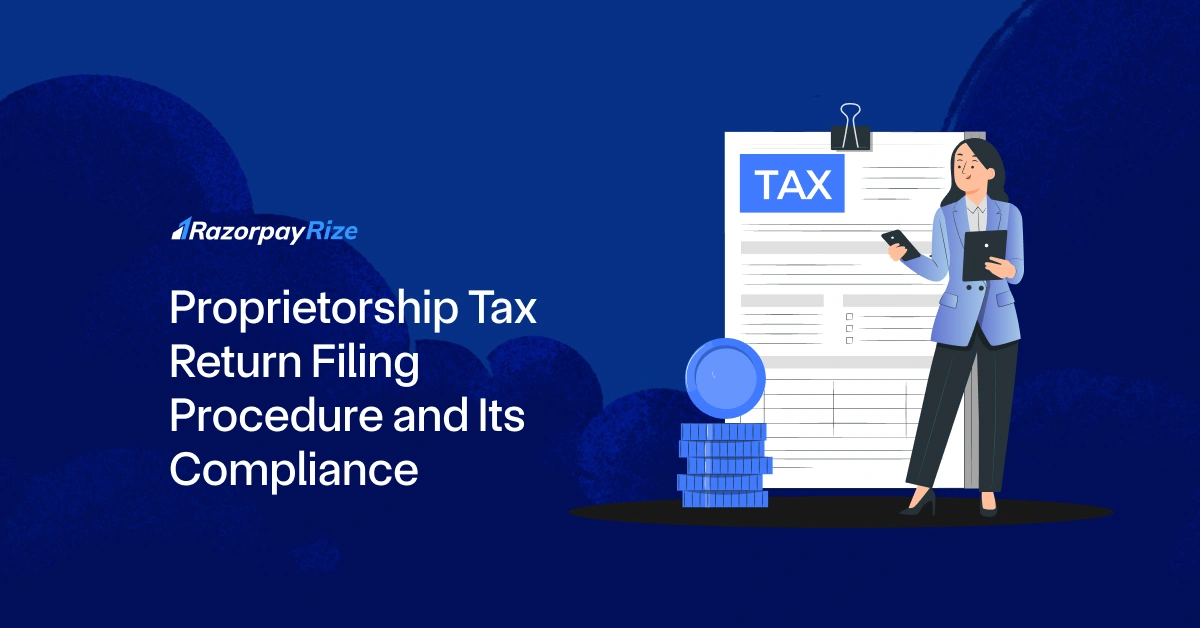A sole proprietorship is the simplest form of business ownership in India. It is not considered a separate legal entity from its owner, which means the business income is treated as the personal income of the proprietor.
As such, tax compliance and return filing are governed by the Income Tax Act for individuals. Filing income tax returns (ITR) is not only a legal requirement but also essential for accessing financial benefits like business loans and expansion opportunities, as well as maintaining a credible financial history.
In this blog, we’ll break down the tax return filing procedure for proprietors, explain key compliances, and highlight the benefits of timely filing.
Table of Contents
Overview of Taxation for Proprietorships in India
In India, proprietorships are taxed as individual taxpayers under the Income Tax Act. The business income is added to the proprietor's total income and taxed according to the applicable individual tax slabs. Proprietors typically file their income tax returns using:
- ITR-3: For individuals and HUFs having income from a proprietary business or profession
- ITR-4 (Sugam): For those opting for the presumptive taxation scheme under sections 44AD, 44ADA, or 44AE
Taxpayers can choose between the old tax regime (with deductions and exemptions) or the new one (with lower tax rates but no exemptions).
Do Proprietorship Firms Need to File Income Tax Returns?
Yes, proprietors are legally obligated to file ITRs if their total income exceeds the basic exemption limit, which for FY 2024-25 is:
- ₹2.5 lakh for individuals below 60 years
- ₹3 lakh for senior citizens (60-80 years)
- ₹3.5 lakh for super senior citizens (above 80 years)
Even if the income is below the exemption limit, filing returns is necessary to carry forward business losses, to claim TDS refunds and if there are any foreign assets or income involved.
Importance of Filing Income Tax Returns for Proprietorship Firms
Beyond legal compliance, filing ITR offers several advantages:
- Financial Credibility: Enhances your chances of securing loans, credit lines, or business investments
- Business Growth: Essential for bidding in tenders and expanding operations
- Avoiding Penalties: Non-filing attracts penalties and interest under the Income Tax Act
- Refund Claims: Enables claiming refunds on excess TDS deducted
{{company-reg-cta}}
Tax Audit for Proprietorship
A tax audit is a review of accounts to ensure accuracy and compliance with tax laws. For proprietorships, audit requirements apply if:
- Turnover exceeds ₹1 crore (business)
- Gross receipts exceed ₹50 lakh (profession)
- Turnover exceeds ₹10 crore if 95% of payments and receipts are digital
Non-compliance with tax audit provisions can attract a penalty under Section 271B, which can be up to 0.5% of turnover or a maximum of ₹1.5 lakh.
Presumptive Taxation Scheme: A Simplified Option for Small Proprietors
To ease compliance for small taxpayers, the Income Tax Act offers presumptive taxation schemes:
- Section 44AD: For small businesses with turnover up to ₹2 crore (to be extended to ₹3 crore from AY 2025-26 if cash transactions are below 5%)
- Section 44ADA: For professionals with receipts up to ₹50 lakh
- Section 44AE: For those involved in the business of transportation
ITR Guidelines for Proprietorship Firms – Union Budget 2024–25 Insights
The Union Budget 2024 brought several important changes aimed at easing compliance, promoting transparency, and offering relief to taxpayers, especially for salaried individuals and businesses.
Here's a quick overview of key updates relevant to individual taxpayers and proprietorships:
1. Increased Standard Deduction Under the New Tax Regime
To offer more relief to salaried individuals, the standard deduction under the new tax regime has been increased from ₹50,000 to ₹75,000.
2. Reduced TDS Rates on Specified Payments
The budget has also reduced the Tax Deducted at Source (TDS) rates on certain specified payments to improve ease of doing business and simplify compliance for both payers and recipients. This change will benefit small and mid-sized businesses by easing their cash flow and lowering the burden of upfront tax deduction.
3. Government Scheme for First-Time Entrepreneurs
The Union Budget 2024 introduced a new loan scheme to support first-time entrepreneurs. The scheme aims to promote inclusive entrepreneurship and boost India’s startup ecosystem.
Proprietorship Tax Rate & Surcharge AY 2025-26 | FY 2024-25
Under the New Regime
Under the Old Tax Regime
Deadline for Proprietorship ITR Filing
- Non-audited firms: July 31st of the assessment year (AY)
- Audited firms: October 31st of the assessment year (AY)
For AY 2025-26:
- Non-audited deadline: July 31, 2025
- Audited deadline: October 31, 2025
List of Documents Needed for Proprietorship Income Tax Return Filing
- PAN card of the proprietor
- Aadhaar card
- Bank account statements
- Profit & Loss statement
- Balance sheet
- GST returns (if registered)
- TDS certificates (Form 16A/26AS)
- Sales invoices and purchase bills
- Expense receipts
- Investment proofs for claiming deductions (under the old regime)
How to File an Income Tax Return for a Proprietorship (Step-by-Step Guide)
Here's a simple, step-by-step guide to help you file accurately and on time:
Step 1: Choose the Right ITR Form
- ITR-3: For proprietors with regular business or professional income
- ITR-4: For those opting for the Presumptive Taxation Scheme under Sections 44AD, 44ADA, or 44AE
Step 2: Prepare Financial Information
- Compile key documents
- Calculate your total income and tax liability
- Claim eligible deductions (only under the old regime).
- Verify TDS credits and advance tax paid.
Step 3: Log into the Portal
- Visit the Income Tax e-Filing portal
- Log in using your PAN and password.
Step 4: Submit the Return
- Select Assessment Year 2025–26 and the appropriate ITR form (ITR-3 or ITR-4)
- Enter all relevant details—income, deductions, taxes paid, etc
- Validate and submit the return
- E-verify using Aadhaar OTP, bank account, or DSC
Step 5: Download
- Download the acknowledgement (ITR-V) and save it for your records.
Conclusion
Running a proprietorship already comes with a long to-do list, and filing your income tax return might feel like just another box to check. But here’s the truth: Filing your ITR on time helps you stay on the right side of the law, but it also unlocks serious advantages like improved loan eligibility, smoother business expansion, and better financial credibility.
That’s why choosing the right ITR form (like ITR-3 or ITR-4), keeping your documents ready, and understanding your tax regime can save you a lot of future headaches.
Don’t wait until the last minute- start organising your financials today and file your ITR on time to stay ahead, stay compliant, and build a more credible, growth-ready business.
Frequently Asked Questions
Private Limited Company
(Pvt. Ltd.)
- Service-based businesses
- Businesses looking to issue shares
- Businesses seeking investment through equity-based funding
Limited Liability Partnership
(LLP)
- Professional services
- Firms seeking any capital contribution from Partners
- Firms sharing resources with limited liability
One Person Company
(OPC)
- Freelancers, Small-scale businesses
- Businesses looking for minimal compliance
- Businesses looking for single-ownership
Private Limited Company
(Pvt. Ltd.)
- Service-based businesses
- Businesses looking to issue shares
- Businesses seeking investment through equity-based funding
One Person Company
(OPC)
- Freelancers, Small-scale businesses
- Businesses looking for minimal compliance
- Businesses looking for single-ownership
Private Limited Company
(Pvt. Ltd.)
- Service-based businesses
- Businesses looking to issue shares
- Businesses seeking investment through equity-based funding
Limited Liability Partnership
(LLP)
- Professional services
- Firms seeking any capital contribution from Partners
- Firms sharing resources with limited liability
Frequently Asked Questions
What is proprietorship compliance?
Proprietorship compliance refers to the set of legal, financial, and tax-related requirements that a sole proprietorship must fulfil. This includes:
- Income tax return (ITR) filing
- GST registration and returns (if applicable)
- Tax audit (if turnover crosses prescribed limits)
- Maintenance of books of accounts
- Maintenance of books of accounts
- TDS deductions and filings (if applicable)
Business licenses like FSSAI, trade license, etc., depending on the nature of the business
Since a proprietorship is not a separate legal entity, all compliances are fulfilled in the name of the individual (proprietor).
Which ITR is applicable for a proprietorship firm?
The applicable ITR forms for proprietorship firms are:
- ITR-3: For proprietors who maintain books of accounts and have regular business or professional income.
- ITR-4: For proprietors who opt for the Presumptive Taxation Scheme under Section 44AD, 44ADA, or 44AE.
Note: ITR-4 is only applicable if your turnover is within the prescribed limit (currently ₹3 crore for businesses opting for digital payments).
What are the requirements for a tax audit for a proprietorship?
A tax audit under Section 44AB is mandatory for a proprietorship if:
- Turnover exceeds ₹1 crore (for business) in a financial year
- Turnover exceeds ₹10 crore for businesses where 95% of payments and receipts are digital
Also, if a proprietor opts out of the presumptive taxation scheme after opting in (under 44AD/44ADA), a tax audit becomes applicable for the next five years, regardless of turnover.
What is the turnover limit for a proprietorship?
There is no fixed turnover limit to run a proprietorship, but there can be certain turnover limits for tax compliance purposes.
Is GST required for a sole proprietorship?
GST registration is mandatory for a sole proprietorship if:
- Turnover exceeds ₹40 lakh (for goods) or ₹20 lakh (for services) in most states
- You are involved in the interstate supply of goods
- You sell on e-commerce platforms (like Amazon, Flipkart)








.webp)







